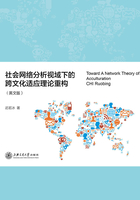
Chapter 1
Introduction
Forget popping champagne and making a resolution—Mexican-born Natalia Garduno welcomes the new year by wearing red underwear.Chinese-bornJack Chen isn't even celebrating New Year's Day until month's end.And Japanese-born Hirokazu Kosaka gets ready for the big day by polishing up his archery set.
In Los Angeles—where one-third of the city is foreign-born and more than a hundred languages are spoken—there are as many ways to ring in the new year as there are cultures to celebrate it.
by Rachel Uranga from Los Angles Daily News
The changed makeup of population due to greater mobility urges academic research to re-examine assumptions about and theoretical representations of culturally mixed communities and societies.Acculturation research is one of the areas that are profoundly affected by greater mobility of people enabled by technological advances today.
The“phenomena which result when groups of individuals having different cultures come into continuous first-hand contact, with subsequent changes in the original cultural patterns of either or both groups”is termed academically as acculturation(Redfield, Linton, & Herskovits, 1936:149).A glimpse of the visualized migration trends on MigrationMap.net(http://migrationsmap.net/about.html)shows clearly that most of the countries in the world nowadays are hosts of people from more than one country.Such a world-wide trend towards more culturally diverse demographics provides a macro-context for the need to reevaluate our understanding of acculturation.
There is, under such circumstances, a need to conduct research that can faithfully capture real-life situations, and to develop theories that can properly inform practices.Rudmin, as one of the leading critics of acculturation research, has insightfully acknowledged such aneed at the beginning of this century that
...as a result of the speed and ease of world travel, global communications, and international marketing, all humans, everywhere, are subject to acculturation processes, whether they know it or not and whether they like it or not.There are no contained societies or protected people isolated from intercultural contact or exempt from cultural change.It is scientifically and ethically wrong to presume otherwise in our theories, in the performance of our research, or in the presentation of our theories and research to the public.(Rudmin,2003, p.6)